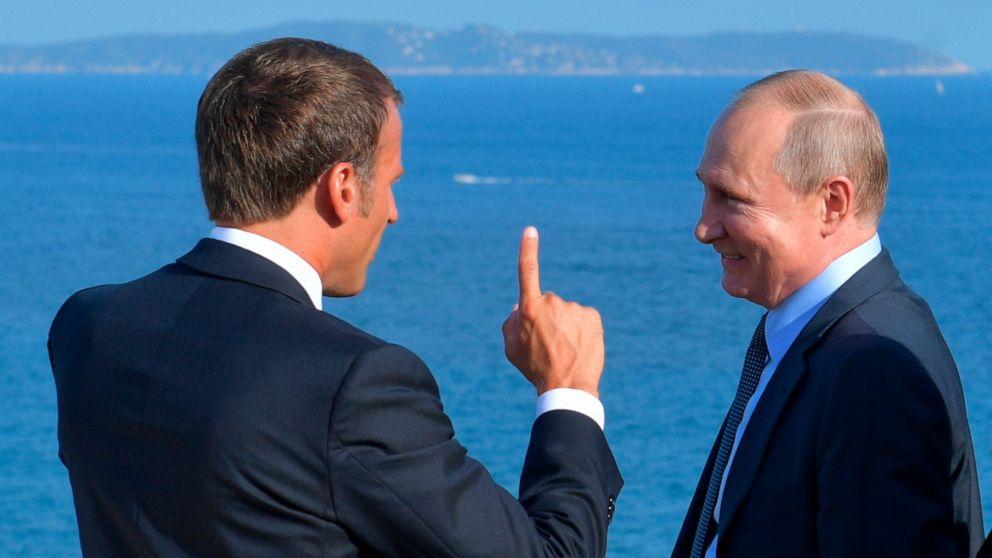Ukraine-Russia crisis: What to know about rising fear of war
BRUSSELS — Several world leaders lined up Monday to walk a diplomatic tightrope that could mean the difference between war in Ukraine and an uneasy peace there as Russia’s menacing actions on the border of its neighbor continued unabated.
Russian President Vladimir Putin was back at the Kremlin in Moscow following his diplomatic foray to get support from China over the weekend during the Winter Olympics. Putin hosts the prime meeting of the day as French counterpart Emmanuel Macron visits on a mission to de-escalate tensions.
Later in Washington, U.S. President Joe Biden will meet with German Chancellor Olaf Scholz at the White House to shore up Western resolve against what they see as Russian aggression.
Western estimates that some 100,000 Russian troops have massed near Ukraine are increasing worries that an offensive could be only days away. At the same time, borders of nations in the NATO military alliance are also being shored up.
FRANCE MAKES A BIG PUSH FOR DE-ESCALATION
Even if the 27-nation European Union as bloc has had little impact on the crisis over Ukraine, France has always felt it could force a breakthrough in the East-West stalemate, and Macron is the epitome of that confidence.
Moscow is only the first of a one-two diplomatic dance that will also take the French leader to Kyiv on Tuesday. His priority is simple — “dialogue with Russia and de-escalation.”
What makes the execution of that much more complicated is the need to keep a unified Western front among over two dozen players in the face of the Kremlin monolith, where one man’s will faces precious little opposition.
Macron’s essential challenge is make sure things don’t get worse on the ground “before building confidence gestures and mechanisms.” In an interview with the French newspaper Journal du Dimanche, he said Putin might make Ukraine only a means to achieve a bigger goal.
“The geopolitical objective of Russia today is clearly not Ukraine, but to clarify the rules of cohabitation with NATO and the EU,” Macron said. Even if Ukraine’ security cannot be a bargaining chip, Macron said “it is also legitimate for Russia to pose the question of its own security.”
AFTER FRENCH MOVE, GERMANY
France and Germany have worked in tandem before. Seven years ago, they were essential in creating a peace deal for eastern Ukraine in a bid to end fighting between Ukrainian government forces and Russia-backed separatists that erupted in 2014 following the Russian annexation of Ukraine’s Crimean Peninsula.
Ukrainian officials have called that peace deal unworkable and divisive, but it did tamper down the fighting.
Germany has been criticized for being slow and halfhearted in its approach to the Ukraine crisis but on Monday, Europe’s economic juggernaut was moving on different fronts. As Chancellor Scholz was getting ready for his meeting with Biden, Foreign Minister Annalena Baerbock had meetings scheduled in Kyiv with Ukrainian President Volodymyr Zelenskyy and is set to visit the “line of contact” with pro-Russia separatists in eastern Ukraine on Tuesday.
Germany’s show of solidarity comes amid tensions over Berlin’s refusal to send weapons to Ukraine. Yet Baerbock said that “we stand — without ifs or buts — by the territorial integrity of the country and at the side of the people in Ukraine.”
Baerbock added that “together, we will react with hard and very concrete measures to any further Russian aggression against Ukraine.”
To show that the Franco-German diplomatic effort is far from over, Scholz will meet Macron and their Polish counterpart Andrzej Duda to discuss the Ukraine crisis on Tuesday.
That will allow the three leaders to compare notes after Scholz’s meeting with Biden in Washington on Monday and Macron’s trip to Russia and Ukraine on Monday and Tuesday.
MORE TROOPS BOLSTER NATO’S EASTERN FRONT
Germany is also mulling sending more troops to Lithuania, potentially reinforcing its presence on NATO’s eastern flank. Defense Minister Christine Lambrecht has raised the possibility ahead of Scholz’s meeting with Biden.
The German leader is due to receive on Thursday the leaders of Lithuania, Latvia and Estonia, the three Baltic states who specifically feel the heat from Moscow, before traveling to Ukraine and Russia next week. Germany has led a NATO battlegroup in Lithuania for the past five years.
A few dozen elite U.S troops and equipment were seen landing Sunday in southeastern Poland near the border with Ukraine, following Biden’s orders to deploy 1,700 soldiers there amid fears of a Russian invasion of Ukraine.
Hundreds more infantry troops of the 82nd Airborne Division are still expected to arrive at the Rzeszow-Jasionka airport, 90 kilometers (56 miles) from Poland’s border with Ukraine.
———
Sylvie Corbet and Vladimir Isachenkov in Moscow, and Geir Moulson in Berlin, contributed to this report.
———
Follow all AP stories on the crisis over Ukraine at https://apnews.com/hub/russia-ukraine.
![]()


